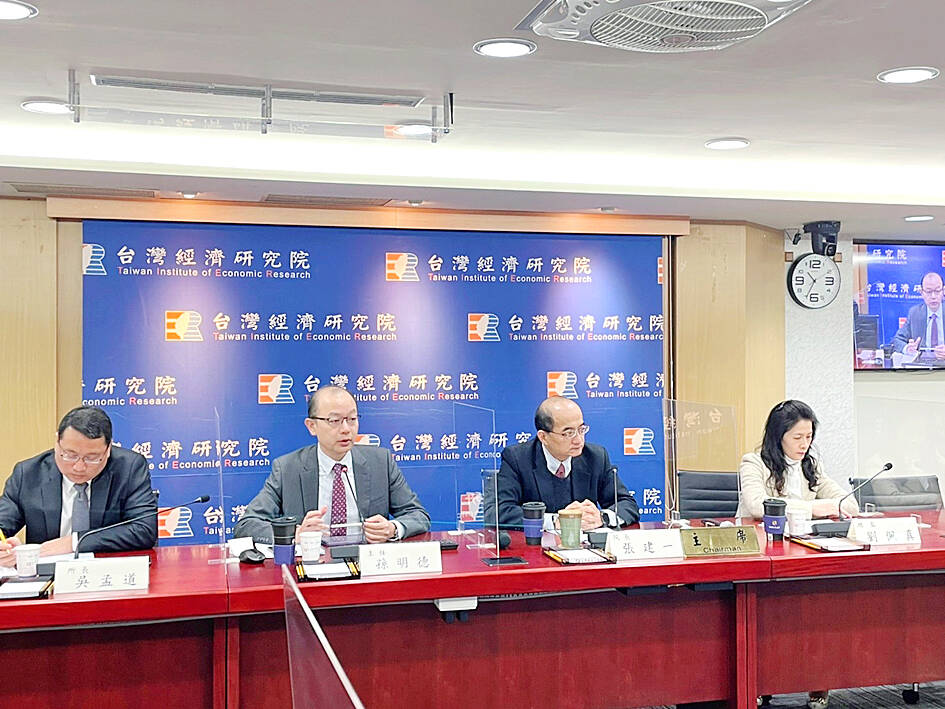The Taiwan Institute of Economic Research (TIER, 台灣經濟研究院) yesterday cut its forecast for Taiwan’s GDP growth this year to 2.58 percent, down 0.33 percentage points from its previous projection, saying that global inflation and monetary tightening would slow foreign trade and private investment.
High inflation would affect the global economy, curtailing demand for goods and services, which would have a negative impact on Taiwan’s exports, TIER president Chang Chien-yi (張建一) said.
Tech and non-tech firms would struggle to digest a glut of inventory in the first half of this year, and it remains to be seen whether demand will recover afterward, Chang said, adding that the global economic landscape looks murky in light of the Ukraine war and other uncertainties.

Photo courtesy of the Taiwan Institute of Economic Research
Exports are expected to increase 1.13 percent this year, while imports would grow 1.25 percent — a downward revision of 1.22 percentage points and 0.54 percentage points respectively, the think tank said.
US technology titans Google, Microsoft Corp, Amazon.com Inc and other companies have laid off more than 70,000 employees, as digital advertisers are spending less and rising inflation is curbing consumer expenditure.
TIER said that private consumption would support Taiwan’s economy this year, as it is expected to increase 5.95 percent, up 1.63 percentage points from its prediction in November last year.
Relaxed COVID-19 restrictions have been fueling a quick recovery for service-oriented businesses, especially in the hospitality and tourism sectors, the institute said.
Private investment would lend limited support to domestic demand, and is expected to increase 2.3 percent from last year, as inventory corrections appear bigger and are lasting longer than expected, prompting firms to become conservative about capital spending, it said.
However, business confidence among local manufacturers rose 0.81 points last month to 85.16, TIER found in a separate survey.
TIER Macroeconomic Forecasting Center director Gordon Sun (孫明德) attributed the uptick to China ditching its “zero COVID” policy, saying it would speed up the recovery in economic activity, despite soaring COVID-19 cases in the short term.
That explains why local suppliers of petrochemical, plastic steel, and machinery products are expecting business to improve in the coming six months and some have benefited from rush orders, Sun said.
Chang said he was concerned that rush orders might not continue, adding that more observation is needed before forecasting a trend.
As for the tech sector, a turnaround might not take place until the second quarter of this year, he said.

Jensen Huang (黃仁勳), founder and CEO of US-based artificial intelligence chip designer Nvidia Corp and Taiwan Semiconductor Manufacturing Co (TSMC, 台積電) on Friday celebrated the first Nvidia Blackwell wafer produced on US soil. Huang visited TSMC’s advanced wafer fab in the US state of Arizona and joined the Taiwanese chipmaker’s executives to witness the efforts to “build the infrastructure that powers the world’s AI factories, right here in America,” Nvidia said in a statement. At the event, Huang joined Y.L. Wang (王英郎), vice president of operations at TSMC, in signing their names on the Blackwell wafer to

France cannot afford to ignore the third credit-rating reduction in less than a year, French Minister of Finance Roland Lescure said. “Three agencies have downgraded us and we can’t ignore this cloud,” he told Franceinfo on Saturday, speaking just hours after S&P lowered his country’s credit rating to “A+” from “AA-” in an unscheduled move. “Fundamentally, it’s an additional cloud to a weather forecast that was already pretty gray. It’s a call for lucidity and responsibility,” he said, adding that this is “a call to be serious.” The credit assessor’s move means France has lost its double-A rating at two of the

AI BOOST: Although Taiwan’s reliance on Chinese rare earth elements is limited, it could face indirect impacts from supply issues and price volatility, an economist said DBS Bank Ltd (星展銀行) has sharply raised its forecast for Taiwan’s economic growth this year to 5.6 percent, citing stronger-than-expected exports and investment linked to artificial intelligence (AI), as it said that the current momentum could peak soon. The acceleration of the global AI race has fueled a surge in Taiwan’s AI-related capital spending and exports of information and communications technology (ICT) products, which have been key drivers of growth this year. “We have revised our GDP forecast for Taiwan upward to 5.6 percent from 4 percent, an upgrade that mainly reflects stronger-than-expected AI-related exports and investment in the third

RARE EARTHS: The call between the US Treasury Secretary and his Chinese counterpart came as Washington sought to rally G7 partners in response to China’s export controls China and the US on Saturday agreed to conduct another round of trade negotiations in the coming week, as the world’s two biggest economies seek to avoid another damaging tit-for-tat tariff battle. Beijing last week announced sweeping controls on the critical rare earths industry, prompting US President Donald Trump to threaten 100 percent tariffs on imports from China in retaliation. Trump had also threatened to cancel his expected meeting with Chinese President Xi Jinping (習近平) in South Korea later this month on the sidelines of the APEC summit. In the latest indication of efforts to resolve their dispute, Chinese state media reported that